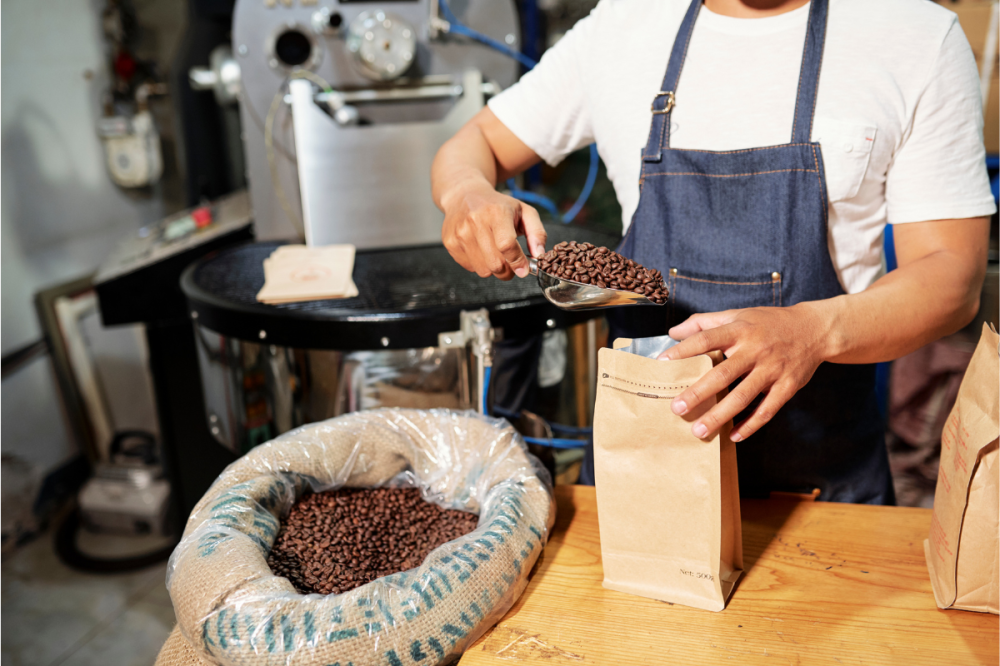There is no doubt that specialty coffee processing is a very important process that greatly affects the final flavor of the coffee. This process includes several methods aimed at extracting unique flavors and improving the quality of the coffee. The most prominent of these methods is the dry method, where the coffee is completely dried before removing the husk, which gives complex flavors and natural sweetness. As for the wet method, it includes peeling the coffee after it is collected and immersing it in water to remove the inner seed, which helps reduce bitterness and highlight acidity. The quality of specialty coffee depends on the precision of these processes and their impact on the balance between sweetness, acidity, and complex flavors, making each method a different experience for coffee lovers.
Article Contents:
- Specialty coffee processing methods
- Advantages of Specialty Coffee Processing
- Specialty coffee processing stages
- Harvest stage
- Dandruff removal (drying) stage
- Fermentation stage (preparation)
- Final drying stage
- Final preparation stage
- The difference between washed and dried coffee processing
- What is the natural processing of coffee called?
- Natural coffee processing stages
- Benefits and Flavors of Naturally Processed Coffee
- Your experience is definitely unique with the Coffee Luxury Store.
Specialty coffee processing methods
There are many different methods for processing specialty coffee, which in turn lead to the final coffee flavour. The most prominent methods for processing coffee are as follows:
1. Dry (natural) method:
This method is considered the oldest and most traditional, where the coffee is collected and left to dry in the sun on stands or flat ground.
- Natural drying contributes to complex flavours and natural sweetness in the coffee, as well as having a limited effect on the acidity of the coffee.
2. Wet (washed) method:
- The coffee is immersed in water after collection to remove the outer layer (husk) and the inner seed.
This method allows for precise control of the fermentation process and results in pure flavours and balanced acidity.
3. Wet method:
- The wet method is similar in removing the husk, but here the coffee is allowed to ferment for a short period afterwards.
This method can give complex flavours and variety to the coffee depending on the brewing method and the surrounding conditions.
4. Natural fermentation (air):
This method involves leaving the coffee without removing the husk and leaving it to ferment for a long period.
This process produces distinctive flavours rich in a wide range of organic compounds.
Each of these methods has a different effect on the flavor, texture, and consistency of specialty coffee, and choosing the right method depends on your specific goals for a distinctive coffee experience.
Read also: Benefits of specialty coffee
Advantages of Specialty Coffee Processing
The specialty coffee processing process has many advantages that give coffee lovers an exciting and wonderful experience with their favorite drink. The advantages of this process include the following:
- High Quality and Complex Flavors: Specialty coffee is processed with extreme care, resulting in high-quality coffee with complex, rich flavors. This is partly due to the use of advanced processing methods such as dry and wet methods.
- Variety of Flavors: Thanks to the careful control of the processing processes, specialty coffee exhibits a great variety of flavors. These flavors can include spices, fruits, chocolate, and citrus, providing a pleasant and varied taste experience for the consumer.
- Sensitivity to production details: Specialty coffee is carefully selected from reputable farms, and the cultivation and processing processes are monitored with the utmost care. This results in higher quality and sustainable standards.
- Unique Consumer Experience: Specialty coffee lovers appreciate the distinct taste experience and wide variety of flavors, making it a more personal and unique experience than regular coffee.
Read also: Best Specialty Coffee Suppliers in Saudi Arabia
Specialty coffee processing stages
Specialty coffee processing involves several essential stages that are carefully implemented to preserve the quality of the coffee and enhance its unique flavor. All of these stages require great attention to detail and close monitoring to ensure obtaining high-quality specialty coffee with rich, balanced flavors. Processing processes vary between regions, farms, and even coffee varieties, which contributes to the diversity of taste experiences consumers have in specialty coffee. Here are the basics of specialty coffee processing stages:
1. Gathering (harvesting):
Coffee is usually harvested by hand, and harvesting methods vary depending on the region and type of coffee.
Only ripe fruits are selected, which requires careful monitoring and frequent sorting.
2. De-dandruff (drying):
- After harvesting, the outer skin of the fruit is removed. This process can be done by dry or wet method.
3. Fermentation (preparation):
- In the case of the wet method, the fruits are placed in tanks with water to remove the inner seed.
- The fermentation period is precisely controlled to achieve the desired flavours and balanced acidity.
4. Final drying:
- After fermentation, the coffee is completely dried. In the dry method, the coffee is dried in the sun on stands or flat ground.
Drying aims to reduce the moisture content of coffee to achieve stability and high quality.
5. Final preparation:
- Here the coffee beans are cleaned and sorted after drying.
This stage may include removing the final peel and sorting by size and quality.
Read also: Types of coffee roasting machines
The difference between washed and dried coffee processing
The difference between washed and dried coffee processing revolves around the different effects of the removal and fermentation processes on the flavour of the coffee. The choice of the appropriate method depends on the preferences of farmers, producers and consumers, local conditions and expectations for the desired flavours in the final coffee.
1. Washed Coffee Process:
- Peeling: After harvesting, the outer peel of the fruits is removed immediately.
- Fruit fermentation: After removing the peel, the fruits are placed in tanks with water to remove the inner seed.
- Drying: After fermentation, the coffee is completely dried in the sun or using mechanical drying machines.
- Flavor and Characteristics: The washed process produces clean, moderately acidic coffee, with sharp, pure flavors. Washed coffee is often more transparent and extra in flavor.
2. Natural Process:
- First drying: After harvesting, the fruits are left with their peels to dry in the sun or in mechanical dryers without removing the peel.
- Natural fermentation: Natural fermentation of the fruits occurs during the drying process, which helps develop complex flavours.
- Final hull removal: After drying, the outer hull of the beans is removed to obtain the final coffee.
- Flavor and Characteristics: The natural drying process produces coffee with diverse and complex flavors, with a sweet and fruity character. This coffee may be less acidic and have more body than washed coffee.
What is the natural processing of coffee called?
Natural coffee processing, also known as natural drying or dry method, is one of the main methods of processing coffee beans after harvest. This method is mainly used in the production of specialty coffee and is an important part of the coffee experience due to the unique flavors it produces.
Stages of natural coffee processing:
1. Collection and selection:
- The fruits are usually picked by hand to ensure that only ripe fruits are selected. This is done carefully to avoid introducing unripe or damaged fruits into the process.
2. First drying:
After harvesting, the fruits are transported to the drying site where they are stacked on metal racks or flat ground.
The fruits are left with their outer skins and exposed to direct sunlight for long periods until they are completely dry. This step is crucial for developing the distinctive flavours in the coffee.
3. Natural fermentation:
- During drying, the fruits inside ferment naturally. Fermentation occurs as a result of the moisture inside the fruits which helps convert the natural sugars into new flavour compounds.
This process plays an important role in forming the fruity, sweet, and complex flavours that characterise naturally processed coffee.
4. Final drying and cleaning:
After fermentation and initial drying, the coffee is transported to other locations to complete the drying process.
The final outer shell is removed and the coffee is sorted by size and quality to ensure a high quality final product.
Benefits and flavours of naturally processed coffee:
- Rich, complex flavors: The natural drying process provides a variety of fruity flavors such as ripe fruits, berries, and citrus fruits like lemon.
- Heavy body and distinctive texture: Naturally processed coffee has a heavy body and rich texture that distinguishes it from washed coffee, which is sometimes lighter and more transparent.
- A wide range of taste experiences: Thanks to the variety of environmental conditions and drying practices, producers can achieve unique and varied flavours that meet consumer preferences.
Your experience is definitely unique with the Coffee Luxury Store.
Rafah Coffee is one of the best specialty coffee shops in the world. It offers a wide range of freshly roasted coffees, which come from carefully selected sources around the world. The store has a diverse selection of specialty coffees, including rare and limited edition varieties from different producing regions. The coffee is carefully selected to ensure the highest levels of quality and excellence in flavors. Just browse our store now.

